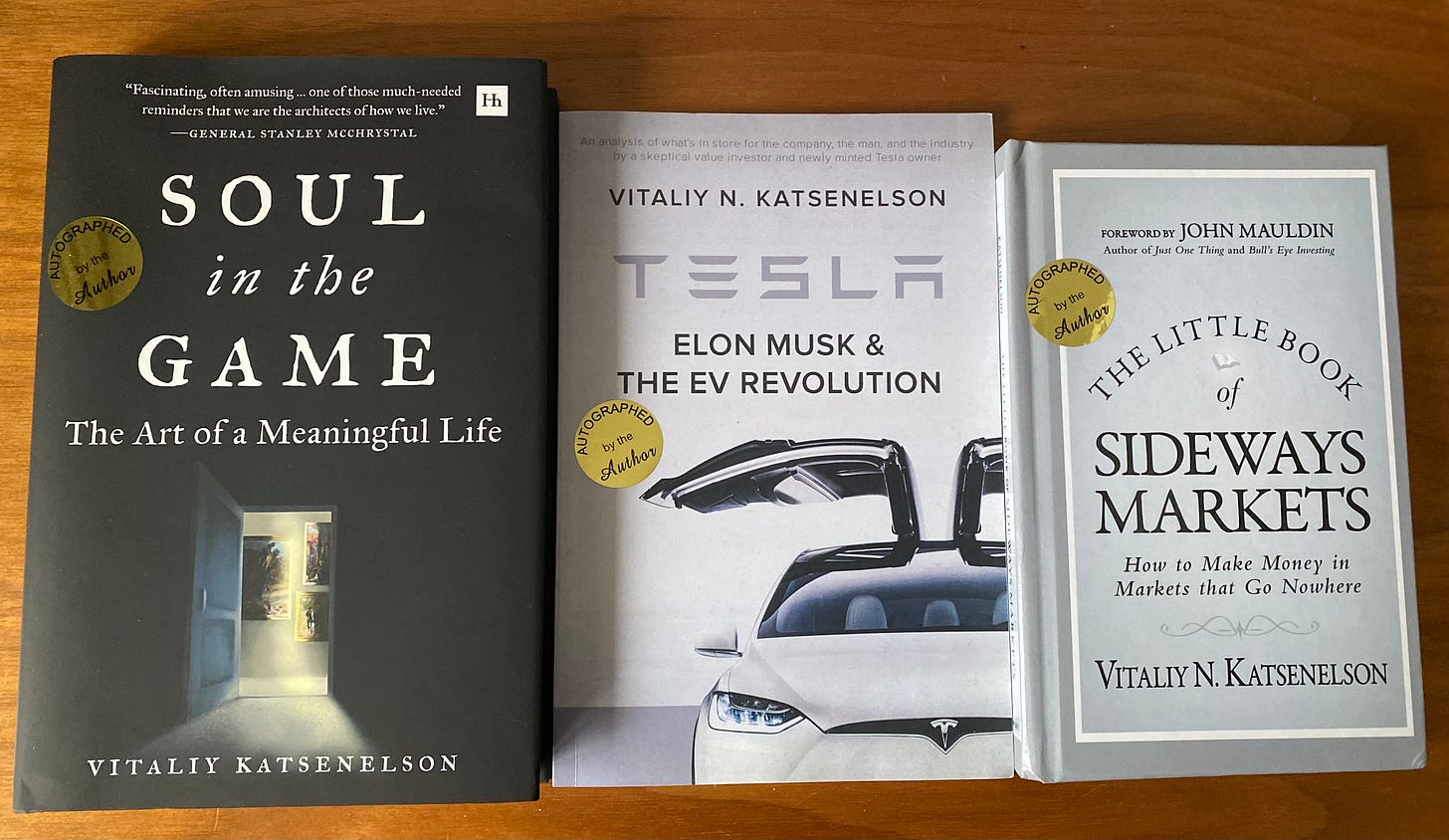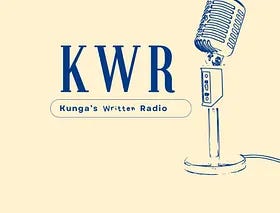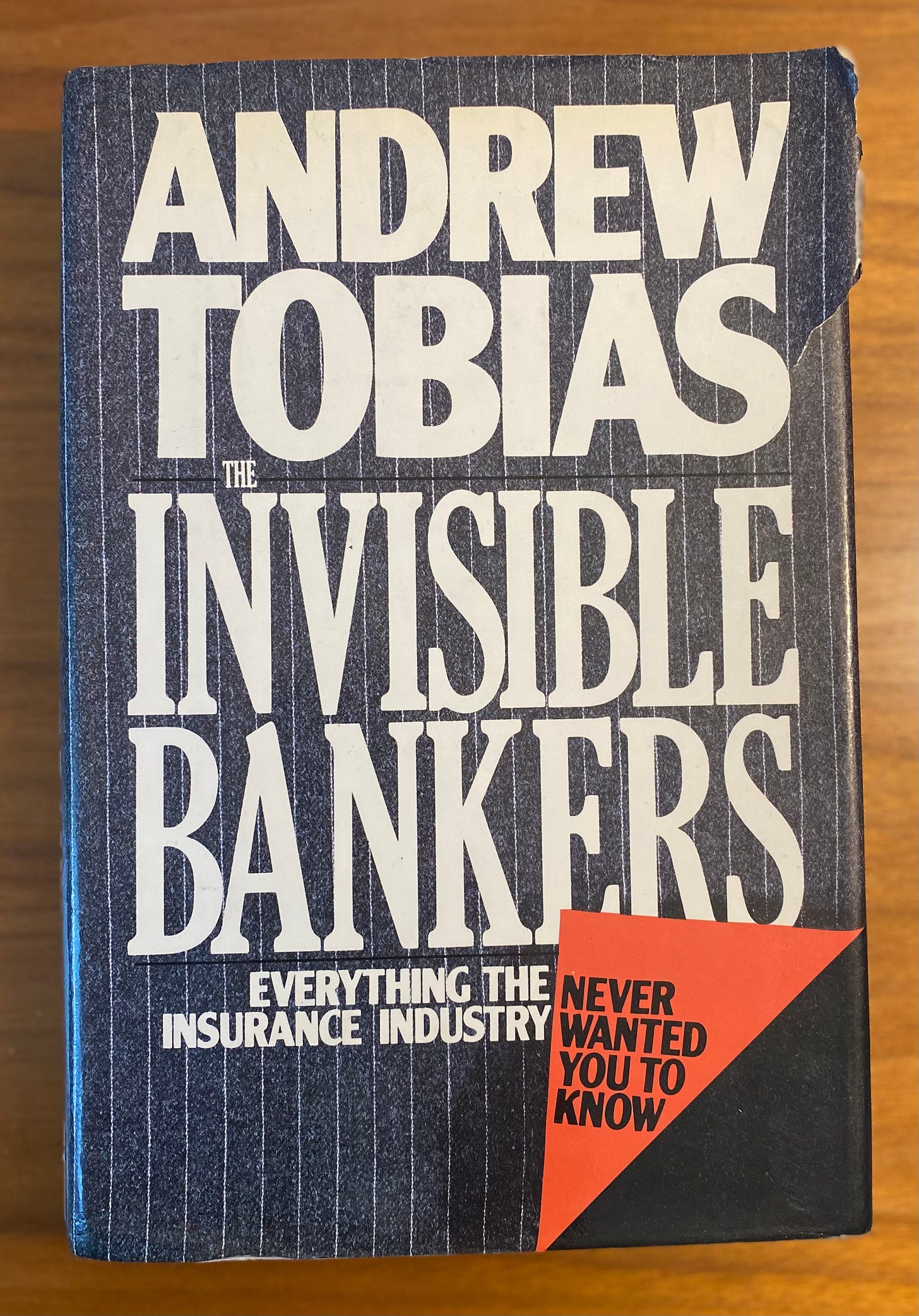September 2023 Portfolio Update
Topics: Quote, Portfolio & Discussion, Comments, Q&A, Books + Section for Paid subscribers.
Quote for this month:
“Men, it has been well said, think in herds. It will be seen that they go mad in herds, while they only recover their senses slowly, and one by one.” - Charles Mackay
Portfolio Update*
*I am NOT a financial advisor, I’m sharing my investing journey. Do your own research.*
Portfolio (Basic):
To get access to full (detailed) portfolio + some other extras consider seven day free trial to get a sneak peek “behind the curtain”
Portfolio Discussion
Currently the numbers showed above go as: (total) $279,232 - (other) $25,000 = (mine) 254,232.
I have been buying a bit of everything IAC 0.00%↑ PYPL 0.00%↑ WBD 0.00%↑ TCS 0.00%↑ MITK 0.00%↑
Reasons I still believe in PYPL 0.00%↑ is because I think that the brand (outside of US) is underappreciated (at least by US investors), their BNPL is underappreciated by the Market, and although they are getting attacked by all side PYPL is still growing and keeping competition in bay:
And don’t get me started on Braintree (like really please don’t get me started I don’t really have hard facts to back anything up and so DO NOT most other people that speculate what is currently going on inside of the company), because I think there is a lot of speculations on how it is and what is happening but nothing can be said for 100% as a lot of things do not get disclosed.
Listen to Goldman Sachs Communacopia + Technology Conference to get a feel for what is PYPL currently working on, a lot of moving parts, a lot of optionality.
Again the whole point with PYPL is that it can play on both sides (with Apple and Google, with Visa and Mastercard, with Klarna and Affirm, Stripe and Adyen, etc etc.)
Not dead yet…
I also started position in BUR 0.00%↑ on 9/11/23, if you are paid subscriber, you would know about it almost real time, will discuss a bit more on it via paid part of the update.
There been rumors of TURO going public which would help IAC’s share price.
Dividends for August:
For now holding on to UG 0.00%↑ and for now will be holding on to the shares of MITK after the earnings report.
Comments From Me
I have decided to try something new/different:
From September 18th to September 24th I will not be doing anything that is related to investing! No apps, no Webull and checking my positions, no books, no websites, no emails, no chatting about investing, etc etc.
Full detox and reset for investing for one week from Monday to Sunday.
I will go cold turkey so if you have to get in touch with me about anything I suggest you doing so before Sunday night of September 17th, I will check my email (last time) and after won’t access it until Sunday night of September 24th or maybe even Monday (morning) the 25th.
To some this might sound weird and I agree, but I also think its something that most people are not able to do easily…including me which is why I think its awesome to try and feel the experience.
The results of the experiment I will discuss in the next month’s update.
I would also like to say BIG THANK YOU to Vitaliy Katsenelson for sending three of his books, because I donated to Tikva:
From this update I will be sharing with paid subscribers a new small portfolio that I started for companies that I cant access with Webull, the portfolio is only around $10,000 so compare to this portfolio its tiny but its a new learning curve for me to wonder out of US via baby steps. There are some really interesting companies out there but the problem is a lot of them do now have as wonderful standards as USA and so doing due diligence is harder and takes longer and so the bets will be much smaller for now. Currently there are four companies that together worth over $8,000+ with the largest position about 60% I believe its a net-net (based of 2022 letter) and with founder owning very large stake, giving me a bit more confidence to buy more of it, I have been considering actually allocating over $10,000-$20,000 just in that one, but as I said taking it slow as I learn more.
The Mind Does More Than Just Play Tricks On You
This is a bit different from my usual format, but I hope y’all will enjoy it - YZ KWR: Hello everyone, today’s broadcast is about how our brain sometimes works against our best investing interests, leading us to accept the wrong conclusions or make the wrong decisions. In a typical day, many of us make around 35,000…
If you haven’t read this one yet, its a collaboration I did with another writer that is not a deep dive into any particular stock/stocks.
Q&A Section
This new section is something I would like to try out, every month I will try to gather some questions and answer them in this section…
If no questions, I would be skipping for that particular month.
Q: I'd love to get your views on portfolio concentration Yegor! This seems like one of the more hotly debated topics among investors, and I'd love to hear your personal thoughts on concentration vs. diversification
A: This is indeed a hotly debated topic and the reason for it (I think) is because its really personal and there is no right or wrong answer. Warren Buffett/Charlie Munger/Mohnish Pabrai have most of their bets in less than 10 companies (I would even say less than five) and yet investors like John Templeton, Peter Lynch, Thomas Gayner, Thomas Russo, some who have 50+ in total stocks and others who got into 20ish yet have half of core and the rest as “trackers”. Like investing in general there is no one size fits all and in so I believe this debate is useless. What is helpful is to ask yourself “what kind of investor you are and what are you comfortable and uncomfortable around” , find what works for you and press on it no matter what others are saying or doing. What works for me, doesn’t have to work for you and we both can be successful, but if you are going to try to copy me and loss mental strength over the fact that you are no comfortable with the sizing and amount of stocks then you are already way behind … maybe not on the P&L but definitely on the mental marathon.
What works for me personally is something around 10ish positions. There is nothing magic about this number (or maybe there is because its round), I try to keep things very simple. Sometimes (lately) I go over 10, closer to 15, cash I do not count as position when counting the stocks and for example if I’m holding FGFPP 0.00%↑ I do not count it for a position per se (since its mostly for dividend, but I do keep an eye on FGF 0.00%↑ company overall) and if I hold OZK 0.00%↑ and OZKAP 0.00%↑ they both would count as one position . So for me around 10 positions is something I can keep track of and even that 10+ is a bit too much to keep track of when I have full time (multiple) jobs and family. If I only did investing I could probably do 10 positions or less as volatility is not the problem when you know your companies very well. 10+ lets to spread the mental exhaustion of volatility a bit more to be able easily withstand draw-downs of 50+ percent.
“Know thyself”.
If you would like to ask me a question for the next Q&A, you can do so by:
To anonymously Ask Me Anything click here via NGL app
Twitter/Instagram/Commonstock DMs
Chat via Substack (there is a thread for free subscribers now)
Email me with your questions to from100kto1m@substack.com
Books
I realized that my descriptions of the books that I read may not always give them full credit as when I read these books and when I write about them, I only share one or two things that really stand out to me. So I have decided to also include a quick short description from Goodreads (no affiliations) so that way you get my thoughts but also more generic description to get a better feel for the books and in so hopefully adding them to your “to-read-list”.
This time around I finished two audiobook and one physical book:
The Creative Act: A Way of Being by Rick Rubin
YZ:
After listening to this book I got a feeling like I’m an artist and substack is my art. I don’t know why I’m having one book a month on spiritual stuff, I honestly do not set it up to be that way.
Goodreads:
Many famed music producers are known for a particular sound that has its day. Rick Rubin is known for something else: creating a space where artists of all different genres and traditions can home in on who they really are and what they really offer. He has made a practice of helping people transcend their self-imposed expectations in order to reconnect with a state of innocence from which the surprising becomes inevitable. Over the years, as he has thought deeply about where creativity comes from and where it doesn't, he has learned that being an artist isn't about your specific output, it's about your relationship to the world. Creativity has a place in everyone's life, and everyone can make that place larger. In fact, there are few more important responsibilities.
The Creative Act is a beautiful and generous course of study that illuminates the path of the artist as a road we all can follow. It distills the wisdom gleaned from a lifetime's work into a luminous reading experience that puts the power to create moments--and lifetimes--of exhilaration and transcendence within closer reach for all of us.
I give it 3.5 out of 5 stars.
The Hour Between Dog and Wolf: How Risk Taking Transforms Us, Body and Mind by John Coates
YZ:
The hour between dog and wolf started off very boringly detailed which I didn’t appreciate until about (more than) half-way through the book. But all the nitty gritty details show validity to the end of the book. When it’s all brought together that knowing yourself, your 100% self is very important. Self meaning, mind, and body . Conscious, subconscious, and gut feeling.
Against my will, I’m recommending this book as long as you can get through the first half.
Goodreads:
A successful Wall Street trader turned Cambridge neuroscientist reveals the biology of financial boom and bust, showing how risk-taking transforms our body chemistry, driving us to extremes of euphoria or stressed-out depression.
The laws of financial boom and bust, it turns out, have a lot to do with male hormones. In a series of startling experiments, Canadian scientist Dr. John Coates identified a feedback loop between testosterone and success that dramatically lowers the fear of risk in men, especially young men; he has vividly dubbed the moment when traders transform into exuberant high flyers "the hour between dog and wolf." Similarly, intense failure leads to a rise in levels of cortisol, which dramatically lowers the appetite for risk. His book expands on his seminal research to offer lessons from the exploding new field studying the biology of risk.
Coates's conclusions shed light on all types of high-pressure decision-making, from the sports field to the battlefield, and leaves us with a powerful to handle risk isn't a matter of mind over body, it's a matter of mind and body working together. We all have it in us to be transformed from dog to wolf; the only question is whether we can understand the causes and the consequences.
I give it 4 out of 5 stars.
Invisible Bankers: Everything the Insurance Industry Never Wanted You to Know by Andrew Tobias
YZ:
Interesting and outdated book taking a look into insurance industry. It was interesting seeing how things were as investor who is looking from the perspective of 2023 and how things have changed and yet when it comes to people looks similar (greed and bureaucracy) would like to find an equal book but for modern times to compare the changes in the industry (if anyone has one please share it with me)
Goodreads:
Explains how insurance works, reveals little-known facts about the industry, and suggests ways it could be improved (circa 1980)
I give it 4 out of 5 stars.
Don’t forget to ❤️ this post. It helps a lot!
Also, I would really appreciate if you would share this post with one person who you think might enjoy it.
IAC 0.00%↑ SFM 0.00%↑ LKQ 0.00%↑ BSM 0.00%↑ WBD 0.00%↑ OZK 0.00%↑ VMD 0.00%↑ PYPL 0.00%↑ SPOT 0.00%↑ TCS 0.00%↑ MITK 0.00%↑ OPFI 0.00%↑ OMAB 0.00%↑ FGFPP 0.00%↑ UG 0.00%↑ VEA 0.00%↑ VTI 0.00%↑ C 0.00%↑ OPBK 0.00%↑ MKL 0.00%↑ URI 0.00%↑ CDLX 0.00%↑ LH 0.00%↑ RICK 0.00%↑ DJCO 0.00%↑ RBLX 0.00%↑ DLTR 0.00%↑ BOC 0.00%↑ ONFO 0.00%↑ IDT 0.00%↑ BUR 0.00%↑ PBR 0.00%↑ FLWS 0.00%↑ ONON 0.00%↑ MASI 0.00%↑ GDOT 0.00%↑ PAR 0.00%↑ ASO 0.00%↑ U 0.00%↑ DBX 0.00%↑ SGA 0.00%↑ ZBRA 0.00%↑ BABA 0.00%↑ NNI 0.00%↑ IBKR 0.00%↑ SSSS 0.00%↑ UHAL 0.00%↑ CPRT 0.00%↑ DEO 0.00%↑ EDR 0.00%↑ MELI 0.00%↑ XPEL 0.00%↑ NU 0.00%↑ WWE 0.00%↑ TKO 0.00%↑ BN 0.00%↑ BUR 0.00%↑
Section below is for paid subscribers…













